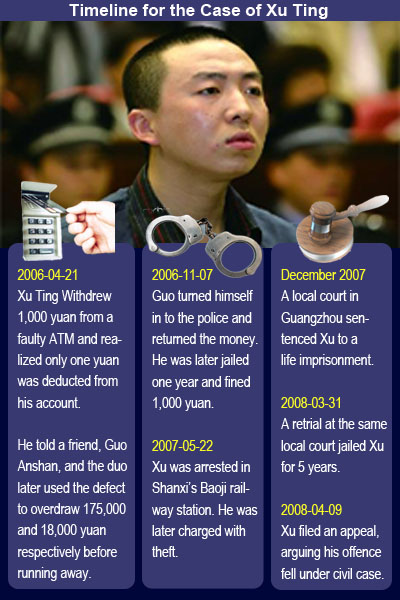From Observer, page 41,issue no. 363, April 14, 2008
Translated by Liu Peng
Original article: [Chinese]
Xu Ting, 25, was an ordinary Chinese youth corrupted by temptation.
Though greed has landed him life imprisonment, public outcry fanned by extensive media coverage has given him a chance for retrial.
The case of Xu Ting – who was charged with theft for withdrawing 175,000 yuan from a malfunctioned automated teller machine (ATM)?at a?Guangzhou Commercial Bank?– sparked off nationwide public debates.
Legal experts might dismiss some public opinion as ignorant of the rule of law with?comments such as "the bank is bribing its customer with a malfunctioning ATM" and "the bank is responsible for tempting the customer to commit a crime" emerged to argue for the "injustice" against Xu.
Though some of the views expressed were emotional in nature, both laymen and experts held a common ground -- the key contentious point was over the severity of punishment rather than the crime itself.

(Note: The crime of theft carries similar penalties applicable to robbery under the Chinese Criminal Law. Theft is punishable for a jail term between three and ten years. More serious offences, such as that against banks and financial institutions, can be jailed for 10 years or more, life imprisonment, even death sentence, in addition to fines, and assets confiscation.)
Morality is less of an issue, unlike several cases in the past that triggered widespread public outcry, such as the case of Sun Zhigang, who was beaten to death in police custody for failing to carry his temporary residence permit. Sun's death eventually led to the end of a two-decade long custody and repatriation system for migrating populations in 2003.
In another case, Yu Xianglin spent 11 years in jail on a charge of murdering his wife, who later was found to be alive. Yu later received monetary compensation from the government.
In comparison, the public views on Xu's case have toned down?the rhetoric and focused more on thoughtful debate. To reflect upon the lessons learnt from the trial of Xu, the EO invited two legal experts to dissect the subject:

Zhang Qianfan
, professor of constitutional law at Peking University

Liu Renwen, researcher at the Law Institute of the Chinese Academy of Social Sciences
Guilty as Charged, but Against Natural Justice
Zhang: Xu Ting is certainly guilty, legally and morally. Although the bank too has the responsibility to maintain its hardware, Xu has deliberately taken the opportunity to commit wrong.
The public held that the sentence was too harsh, a reaction that stems from common sense, and that also reflected natural justice. For example, the law shouldn't prescribe life imprisonment for stealing 20 yuan while imposing five-year jail term for stealing 200,000 yuan. A judge should not interpret the law in such a manner, or else, it is against natural ration.
The most debatable question of Xu's case is that many corrupted officials took tens of millions of bribes but were sentenced to life imprisonment at most. Yet, the same applied to taking 170,000 yuan. Is committing theft trough a faulty ATM more serious than corruption trough various means?
Liu: In the retrial, Xu defended himself as temporarily safeguarding the money for the bank. But from common sense, it is a bad excuse, because the bank never entrusted him to do so.
In the initial judgment, a life imprisonment created uproars in the society because the public think the punishment is too severe. Increasingly complicated social problems are challenging the way laws are interpreted and applied. What is law? Once a justice of the United States' Supreme Court said law was the result of a judge delivering reasonable and applicable judgment. In other words, a judge should find a result that most suited the spirit and objective of law, and in line with public sentiment.
Media Power and Public Pressure
Zhang: "Trial by the Media" is an inappropriate term. The media has no right to and cannot preside over a trial. However, it has the freedom to comment. In fact, it is difficult to contain debates in public space either over the internet or in contemporary media. As judicial injustices and corruptions are still rather common in China, scrutiny by various parties is necessary, and media plays an important role here. The initial verdict on Xu highlighted problems of outdated legislation and judicial rigidity…and the media became a channel for redress.
The result of this case (public pressure contributed to a retrial) only presented a scenario of interaction between the media, the public, and the?court. The case of Xu Ting will remain an isolated one if we fail to institutionalize a system of references for judicial precedent. When another case crops up the next time, we might still face judges using their own discretion at will to deliver verdict.
Liu: I must say Xu ting is lucky. If there was no extensive media coverage that generated widespread public attention, the ending would have been different. Under the media's spotlight, Guangdong province's Superior Court sent the case back to the local court and ordered a retrial. I think such action ought to be criticized.
The pre-requirement for a retrial is lack of evidence or unsound evidence in supporting the verdict. In this case, the facts and evidences are very clear, but the ball was kicked back to the same local court. The procedure is questionable, as the same court delivered such different sentencing on the same case is puzzling. However, it would have been more understandable if the retrial and fresh verdict were made by a higher court.
When the case was returned to the lower court, the latter was under the impression that its superior was unhappy with the severe judgment, thus it started reviewing the case by arguing that the nature of "theft" in this case was unique as it was due to ATM malfunctioning. To alter the verdict, the lower court needed a legal ground, and found article 63 (2) of the Criminal Law that allowed the penalty to be mitigated based on unique circumstances of the case and with approval from the Supreme Court.
During the top legislative meets (in March), some higher court officials have openly commented through the media that the penalty on Xu was too harsh, this action is against the principle of judiciary independence, against the independence of the local court and the judge to carry out trial. Judicial proceeding should not blindly succumb to public pressure, however, it should pay attention to public opinion, this has been a practice in many countries.
The Significance of Xu Ting's Case
Zhang: The significance of Xu Ting's case lies in that the public has reinterpreted the country's legislation, or at least prompted a review on the loopholes in the Criminal Law. Through expressing their displeasure over the initial verdict, the public has pressured the courts to look into outdated provisions in the law, and demanded the courts to interpret laws in line with contemporary ideas.
Of course, to treat the root of the problem is to improve the system of National People's Congress. Under the current circumstances,?direct participation has become a way for the public to defend their rights. The case of Xu ting is just one of the many incidents when the public has told shown the government where they stand.
Liu: It can become a case study, and serve as reference for future cases of a similar nature. The case has prompted us to think about how to introduce judicial precedent system into our legal framework.
From now on, perhaps cases similar to that of Xu would no longer get life imprisonment. In the past, our legal system was more concerned about defining a crime, but once an accused is found guilty as charged, the severity of penalty differed greatly – from five-year jail terms to life imprisonment. Perhaps, we could consider in the future, when prosecutors bring a case to the court, besides?presenting the charge, they should also make suggestion on applicable penalty.






